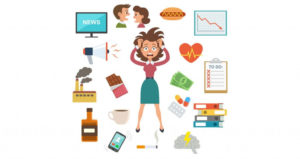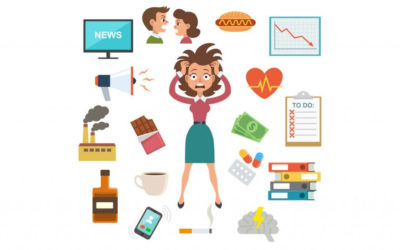I hope you are enjoying the start of your summer! This month’s newsletter is dedicated to what to do in the moment when you are really stressed out. I have written previously about “holding your center” when things are falling apart or where you are having a major life stressor(s). (Please see my March 8th e-Newsletter).

Acute stress such as worrying about deadlines, being late, performance anxiety, or dealing with frustrating customer service, can unfortunately be very harmful, and therefore is critical for you to interrupt and halt the stress response and ideally prevent it from occurring.
I want to point out that all stress is not bad, as we need some positive stress to energize and motivate us, and increase our focus and performance. This is called EUSTRESS.
We also need the stress response in emergent situations.
You see, when you get stressed, your body pumps out adrenaline (also called epinephrine), and cortisol, hormones that work to get your body and mind ready to “fight or flee.” Your heart rate increases to pump blood around the body, your pupils dilate so you can see better, your respirations get faster and shallower, blood is directed away from the stomach and sexual organs to the large muscles of the arms and legs, so you are ready for action.
But many of us, including myself, have gotten aggravated and stressed, out of proportion to situations that are not life threatening. We catastrophize. This excessive stress reaction can damage our minds and bodies.

For these Acute Stressful Situations, I recommend the following:
- Notice that you are stressed—you might feel sensations of tightness in your chest or your body, your heart may be racing, your scalp might tighten, or you might have diarrhea.
- Breathe—take a deep breath in through your nose and breathe out long and slowly through your mouth. Do this at least 3 times, and you can continue to do this being mindful not to breathe too quickly.
- Put your hand on your heart, and think and feel gratitude for a person, place, thing, or experience in your life.
- Distract yourself—fantasize about something—whatever it takes– to stop your worry, anxiety, fear, and the stress response.
For more techniques for acute stress, please read my forthcoming book, Don’t Mess with Stress™. For additional support, one can learn techniques including Cognitive Behavioral Therapy, (CBT), from a trained clinician. To get a head start, you, can read David Burns’ book, Feeling Good: The New Mood Therapy, a primer based on CBT, which can give you tools and techniques to help you right away.
To Your Optimal Health,
Dr. Jill Baron
1. https://www.heartmath.org/science/
Disclaimer: Please note that the content on this newsletter does not constitute medical advice. Please consult with a physician before making any medical or lifestyle changes.

